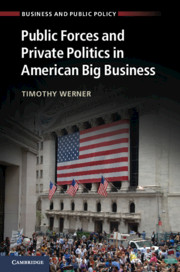Book contents
- Frontmatter
- Contents
- List of illustrations
- List of tables
- Acknowledgements
- 1 Introduction
- 2 The firm as political actor and a theory of private policymaking
- 3 Unveiling the public roots of private policymaking
- 4 The public, the state, and corporate environmentalism
- 5 Public opinion and gay rights in the workplace
- 6 Total executive compensation and regulatory threat
- 7 Conclusion
- Appendix: Data sources and variable measurement by chapter
- References
- Index
2 - The firm as political actor and a theory of private policymaking
Published online by Cambridge University Press: 05 July 2012
- Frontmatter
- Contents
- List of illustrations
- List of tables
- Acknowledgements
- 1 Introduction
- 2 The firm as political actor and a theory of private policymaking
- 3 Unveiling the public roots of private policymaking
- 4 The public, the state, and corporate environmentalism
- 5 Public opinion and gay rights in the workplace
- 6 Total executive compensation and regulatory threat
- 7 Conclusion
- Appendix: Data sources and variable measurement by chapter
- References
- Index
Summary
A lack of attention from political science to the internal dynamics of the corporation has resulted in the field failing to develop a coherent micro-level theory of the firm as a political actor. As Coen, Grant, and Wilson (2010) state, “political scientists have been more focused on understanding the institutional structures and political environments in which firms operate than on understanding the actions and strategies of firms themselves” (12). In this chapter, my goal is to address this flaw by developing a firm-level theory of decision-making in private politics within the context of the political-economic environment I described in Chapter 1.
I begin this chapter by examining three existing conceptualizations of the firm that scholars across disciplines employ to study firm behavior in contentious and private politics. I use these three approaches, especially the behavioral theory of the firm, to develop and justify a set of assumptions about firms' political decision-making that provide us with a shared concept of the firm as a political actor. I then use these assumptions in the second part of the chapter to advance a theory of private policymaking that models the decisions firms make regarding whether or not to adopt private policies. The theory of private policymaking I articulate suggests that individual firms' decisions are highly contingent on the underlying politics of a given issue, as well as a firm's political capacity and its reputation.
- Type
- Chapter
- Information
- Publisher: Cambridge University PressPrint publication year: 2012



